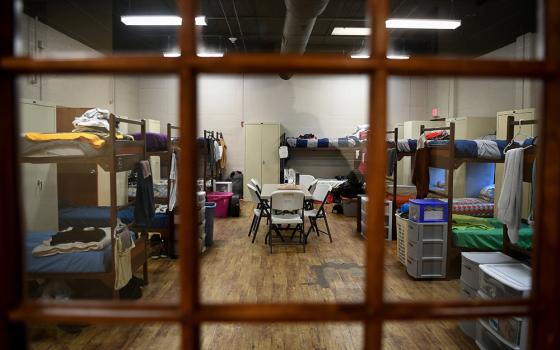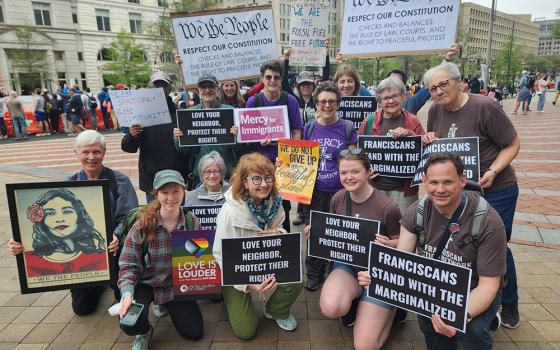 RELIGION, POLITICS, AND POLARIZATION: HOW RELIGIOPOLITICAL CONFLICT IS CHANGING CONGRESS AND AMERICAN DEMOCRACY
RELIGION, POLITICS, AND POLARIZATION: HOW RELIGIOPOLITICAL CONFLICT IS CHANGING CONGRESS AND AMERICAN DEMOCRACY
By William V. D'Antonio, Steven A. Tuch and Josiah R. Baker
Published by Rowman & Littlefield, $28
Most Americans who lived through Congress's recent inability to agree on the annual budget, fund the government, and raise the debt ceiling would readily agree that it is more polarized today than 30 years ago. But why? What pulls the Congress apart so powerfully that they can no longer collaborate?
It would seem that religion might explain much of this. After all, religion shapes our understanding of ultimate meaning and lays the foundation for our most basic values. We know that religious leaders have raised powerful voices in public debates about abortion, health care and, to a lesser degree, welfare. It ought to be easy to highlight religion's powerful influence in shaping Congress's recent trajectory to conflict. And yet Religion, Politics, and Polarization tempers any such conclusion. Despite its authors' clear expectation that they would uncover religion's power, it appears that party affiliation matters far more than religion.
Few social scientists have attempted to measure religion's influence on the U.S. Congress with the level of precision that William D'Antonio, Steven Tuch and Josiah Baker exercise in their fine new study. Their brief but dense work traces representatives' and senators' voting patterns over the past 35 years and reveals, unsurprisingly, that Democrats and Republicans have become more uniform within their parties and more set against their opponents on key issues such as abortion rights, defense spending, support for programs that aid the poor, and taxes.
The surprise comes when the authors try to determine religion's role in dividing Congress. It appears that party affiliation matters much more than religious affiliation even on an issue like abortion. Democrats cast fully 90 percent of their votes taken in recent years in the House and Senate in favor of a woman's right to choose, while only 10 percent of Republicans did so. Catholic Democrats supported abortion rights in their votes only a bit less than other Democrats, while Catholic Republicans opposed those rights slightly more than other Republicans. Party affiliation better predicted how a senator or representative voted on even the lightning-rod moral question of abortion than did religion. On other issues of Catholic social teaching, Catholic Democrats also followed their party's strong support for the poor, while Catholic Republicans veered from Catholic teaching to follow their party's opposition to the social safety net.
But what about the rise of conservative Protestants in American politics? Do we see their religion pulling them toward a particular side in the culture war? Perhaps. White conservative Protestants do oppose abortion, favor expanding defense spending, and oppose assistance to the needy in very high numbers, and their rise in the House especially has driven much of the polarization that we see on questions like abortion, defense spending, taxes and welfare. Their rise coincided with the decline in the number (and therefore influence) of representatives and senators who belong to mainline Protestant denominations. Coupling these two phenomena does seem to drive Congress's polarization. But here, too, we must exercise caution, because African-American conservative Protestants (who favor abortion rights, seek to limit defense spending, and support programs that aid the poor) have also joined Congress. They do not follow the white conservative Protestant patterns. Just as with Catholics, conservative Protestants in Congress tend to follow Democratic or Republican Party voting trends more than religious imperatives. The authors conclude that it is "plausible," but not "certain," that the shift of white conservative Protestants from Democrat to Republican explains much of the polarization.
Reading the data that the authors have culled so carefully leads one to conclude that religion is not driving Congress' polarization so much as getting swept up by it. Or perhaps our religious categories obscure a more powerful religious influence. Though the authors refine denominational categories a bit to separate Protestants into mainline and conservative, there is no ready way to carve up the denominations themselves into the meaningful and measureable categories that seem to shape worldviews so powerfully. All Catholics fit into one category in this analysis, but most Catholics (and certainly NCR readers) know that the laity divides powerfully along progressive and conservative lines. Few Catholics subscribe to both The Wanderer and to NCR, but both sets of readers' religious convictions animate their actions significantly. Maybe that's the religious divide that is "changing Congress and American democracy," but it remains too elusive for the authors to measure.
In the end, the authors can show persuasively that Congress has polarized, and that its members' religious affiliations have shifted away from mainline Protestantism and toward Catholicism and conservative Protestantism. But their data do not prove that religiopolitical conflict drives congressional polarization.
[Timothy Kelly is department chair and professor of history at St. Vincent College in Latrobe, Pa.]



